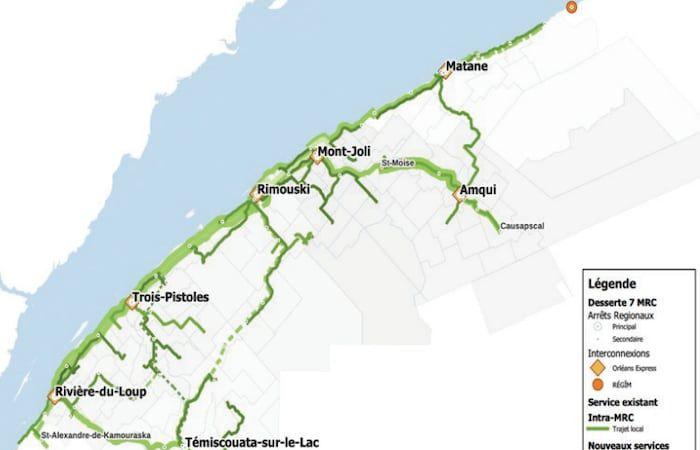The political community of Bas-Saint-Laurent intends to intensify pressure on the Legault government in order to demand a tax on gasoline to finance the public transport network project. Municipal elected officials find themselves more motivated than ever following the publication of a report which validates their arguments in favor of an increase of two cents per liter of gasoline sold.
This report above all constitutes additional ammunition for the region’s municipal elected officials in their standoff with Quebec over the financing method to adopt for the Régie de transport du Bas-Saint-Laurent. Last fall, the Legault government ruled out the possibility of a tax on gasoline in the territory and instead suggested a tax on vehicle registration (TIV).
These so far unsuccessful talks have had the effect of postponing the implementation of the project until 2026.
We wanted to expand on our argument to ensure that our reasoning held up.
explains Mélodie Mondor, general director of the Bas-Saint-Laurent Regional Development Collective, an organization that oversees the Transport Authority and which commissioned this study.
Open in full screen mode
Preliminary map representing the route possibilities offered by a Bas-Saint-Laurent transport authority
Photo: Provided by the Régie de transport du Bas-Saint-Laurent
Taxing registration would be half as profitable
Impose a tax on gasoline in Bas-Saint-Laurent appears to be the best [solution] to finance public transportation
concludes the 16-page report produced by the firm AppÉco.
A tax on registration, an avenue recommended by Minister of Finance Eric Girard, would not only be half as profitable for the Transport Authority, it would also cost Lower Laurentian taxpayers more than double compared to a tax on gasoline. .
At the end of its comparative analysis, the firm concluded that a tax on gasoline would represent an additional annual sum of 39 dollars per household, while a tax on registration would amount to nearly 80 dollars. These amounts take into account the Régie’s objective of raising around $5.3 million per year to finance its activities.
Start of widget. Skip the widget?End of widget. Return to start of widget?
AppÉco explains this gap between the two methods of taxation by the fact that the more than 50,000 Rimouski residents would not have to pay a tax on registration, because the City is not authorized to collect the revenue from this charge. tax.
In addition to being nearly double the cost, the registration tax would be less fair than a gas tax
confirms Philippe Gougeon, director and economist at AppEco, and author of the study. The firm explains that more motorists would be subject to a gas tax, such as tourists passing through the region or temporary residents.
If the study validates what the elected representatives of Bas-Saint-Laurent have been hammering home for more than a year, it also tells us that the fiscal burden of a tax on registration in Bas-Saint-Laurent would be similar to that of Quebec and Montreal, but with a much less developed transportation service.
Start of widget. Skip the widget?End of widget. Return to start of widget?
In the Capitale-Nationale and in Montreal, we are talking about daily public transport systems, very developed and highly accessible, while in Bas-Saint-Laurent, we are talking about a public transport system which would sometimes be just a times a week, twice a week, therefore with a much lower frequency
comments Philippe Gougeon, former chief of staff to Minister Girard.
For its part, the gas tax would represent 0.06% of the disposable income of taxable households in the region, again according to the study.
However, it does not take into account the evolution of gasoline consumption, which is expected to decrease in the coming years. Mélodie Mondor replies that taxing the pump is the best solution in the short term, while Philippe Gougeon affirms that the amount collected would have to be significantly increased to reach the tax burden represented by a tax on registration.
The gas tax, a plan B
Even if they are not giving up on the subject of the gas tax, municipal elected officials maintain that it is presented as the main solution in the absence of an increase in funding dedicated to public transport. In this regard, Mélodie Mondor is sad to note that none of the sums allocated for this purpose in Quebec’s latest economic update concern regional transportation.
Open in full screen mode
Mélodie Mondor is also secretary of the Bas-Saint-Laurent transport authority.
Photo: - / Jean-Luc Blanchet
We are talking about only 6% of the envelope for Quebec which is directed towards rural collective transport, while rurality in Quebec represents more than 30% of the population.
explains the general director of the Bas-Saint-Laurent Regional Development Collective. What we are saying initially is that there is a tax disadvantage, a lack of equalization in the financing of regular public transportation services from the Ministry of Transport.
If there was an adjustment made at this level […]we would not have needed to go for this solution, which is the increase in the gas tax. But since this funding is clearly insufficient to ensure adapted transportation services, we turned to a financing mechanism that costs the Quebec government nothing.
Provided, she insists, that the project to establish a dozen minibus lines from Rivière-du-Loup to Matane via Amqui and Dégelis sees the light of day. On this, AppEco recognizes the benefits of this project, particularly for populations in rural areas.
A regional public transportation service has significant benefits for its population, particularly for people for whom it may be more complicated to get around
argues the study.
With this new indirect support, the Bas-Saint-Laurent Regional Development Collective intends to increase its actions in the coming months to make itself heard in Quebec.
We are confident that after a while, the government will listen to reason on the arguments that we have been making for several months, and elected officials are determined to stay the course on this method of financing or any other increase that the government could offer beyond the registration tax,
believes Mélodie Mondor.







